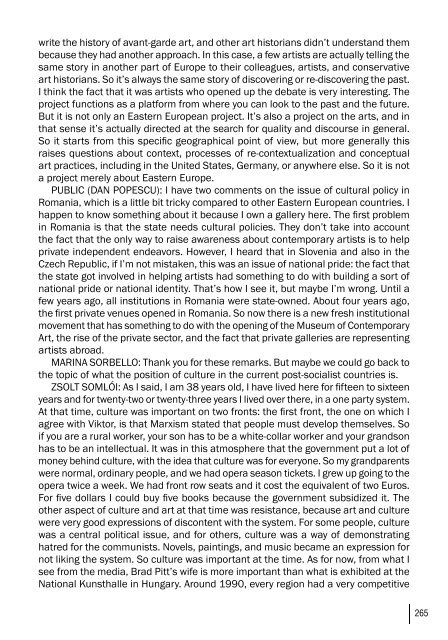art-e-conomy _ reader - marko stamenkovic
art-e-conomy _ reader - marko stamenkovic
art-e-conomy _ reader - marko stamenkovic
You also want an ePaper? Increase the reach of your titles
YUMPU automatically turns print PDFs into web optimized ePapers that Google loves.
write the history of avant-garde <strong>art</strong>, and other <strong>art</strong> historians didn’t understand them<br />
because they had another approach. In this case, a few <strong>art</strong>ists are actually telling the<br />
same story in another p<strong>art</strong> of Europe to their colleagues, <strong>art</strong>ists, and conservative<br />
<strong>art</strong> historians. So it’s always the same story of discovering or re-discovering the past.<br />
I think the fact that it was <strong>art</strong>ists who opened up the debate is very interesting. The<br />
project functions as a platform from where you can look to the past and the future.<br />
But it is not only an Eastern European project. It’s also a project on the <strong>art</strong>s, and in<br />
that sense it’s actually directed at the search for quality and discourse in general.<br />
So it st<strong>art</strong>s from this specific geographical point of view, but more generally this<br />
raises questions about context, processes of re-contextualization and conceptual<br />
<strong>art</strong> practices, including in the United States, Germany, or anywhere else. So it is not<br />
a project merely about Eastern Europe.<br />
PUBLIC (DAN POPESCU): I have two comments on the issue of cultural policy in<br />
Romania, which is a little bit tricky compared to other Eastern European countries. I<br />
happen to know something about it because I own a gallery here. The first problem<br />
in Romania is that the state needs cultural policies. They don’t take into account<br />
the fact that the only way to raise awareness about contemporary <strong>art</strong>ists is to help<br />
private independent endeavors. However, I heard that in Slovenia and also in the<br />
Czech Republic, if I’m not mistaken, this was an issue of national pride: the fact that<br />
the state got involved in helping <strong>art</strong>ists had something to do with building a sort of<br />
national pride or national identity. That’s how I see it, but maybe I’m wrong. Until a<br />
few years ago, all institutions in Romania were state-owned. About four years ago,<br />
the first private venues opened in Romania. So now there is a new fresh institutional<br />
movement that has something to do with the opening of the Museum of Contemporary<br />
Art, the rise of the private sector, and the fact that private galleries are representing<br />
<strong>art</strong>ists abroad.<br />
MARINA SORBELLO: Thank you for these remarks. But maybe we could go back to<br />
the topic of what the position of culture in the current post-socialist countries is.<br />
ZSOLT SOMLÓI: As I said, I am 38 years old, I have lived here for fifteen to sixteen<br />
years and for twenty-two or twenty-three years I lived over there, in a one p<strong>art</strong>y system.<br />
At that time, culture was important on two fronts: the first front, the one on which I<br />
agree with Viktor, is that Marxism stated that people must develop themselves. So<br />
if you are a rural worker, your son has to be a white-collar worker and your grandson<br />
has to be an intellectual. It was in this atmosphere that the government put a lot of<br />
money behind culture, with the idea that culture was for everyone. So my grandparents<br />
were normal, ordinary people, and we had opera season tickets. I grew up going to the<br />
opera twice a week. We had front row seats and it cost the equivalent of two Euros.<br />
For five dollars I could buy five books because the government subsidized it. The<br />
other aspect of culture and <strong>art</strong> at that time was resistance, because <strong>art</strong> and culture<br />
were very good expressions of discontent with the system. For some people, culture<br />
was a central political issue, and for others, culture was a way of demonstrating<br />
hatred for the communists. Novels, paintings, and music became an expression for<br />
not liking the system. So culture was important at the time. As for now, from what I<br />
see from the media, Brad Pitt’s wife is more important than what is exhibited at the<br />
National Kunsthalle in Hungary. Around 1990, every region had a very competitive<br />
265


